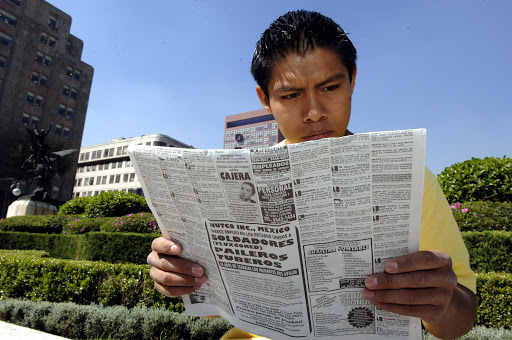One in every six young people aged 18 to 29 in Latin America and the Caribbean has left work since the pandemic began, studies show.
“17 years old, looking for work, immediately.” “22-year-old looking for cleaning jobs, please help.”
“Looking for work,” writes an 18-year-old. “I have tattoos.”
These cries for help are among the thousands posted over the past month to a Facebook group for young people looking for jobs in the Mexican city of Guadalajara.
Some of the pleas are brief and to the point. Others offer more details of the struggles facing Mexican youths who lost their jobs to the coronavirus pandemic.
“I’m a stylist but I lost my job because of the pandemic,” wrote a young mother of three children. “I’m looking for a job in whatever I can do, urgently, thank you.”
Though Mexico’s economy is expected to grow 5 percent this year, after contracting a whopping 8.2 percent in 2020, according to the International Monetary Fund, the recovery is not happening fast enough for the nation’s struggling youths.
Over half of all job losses in Mexico in the 10 months ending December 2020 were suffered by young people under the age of 29, according to the Mexican Institute of Social Security.
Mexico’s struggles reflect a broader regional problem.
One in every six young people aged 18 to 29 in Latin America and the Caribbean has left work since the pandemic began, a recent study by Canadian charity Cuso found.
Andrea Olmos, who lives in central Mexico City with her mother and grandfather, is among them. The 22-year-old was let go from her administrative position at an insurance company in March of last year, when the pandemic started raging through the Americas.
“Young people were the first to lose their jobs,” she told Al Jazeera.
Olmos said she was placed at a disadvantage compared to older workers on the payroll, because she was a contract worker, not a full-time employee. But she still considers herself fortunate, having continued her studies online and having landed a scholarship to participate in a youth mentorship programme that she hopes will help her to find steady employment in the future.
“I have classmates who have had to drop out of their studies for reasons related to the pandemic, and friends who have searched high and low for work and found nothing,” she said. “There’s just hardly any opportunities.”
In a harbinger of even more possible youth struggles ahead, some 4 million young people are currently at risk of remaining outside both education and employment, according to Youth Alliance for Dignified Work, an advocacy group.
Government stinginess
Unlike other Latin American governments, the administration of President Andres Manuel Lopez Obrador (also known as AMLO) did not step up with a big government-funded stimulus package to help businesses and households weather the pandemic and recover from its ravages.
Instead, AMLO’s government provided only very limited assistance to workers and small businesses. While that has helped keep Mexico’s debt in check, the economic scarring from the pandemic runs deep and the recovery is slow.
Luis Mauricio Torres, coordinator of operations and economic analysis at the Mexican Institute for Competitiveness (IMCO), a think-tank, told Al Jazeera that while there has been an overall recovery afoot in Mexico’s jobs market, “Young people are still struggling to get back to work.”
When they do find work, says Torres, they are far more likely to end up in less secure and poorer-paying positions in Mexico’s large informal jobs sector.
“It’s difficult to get a formal job in Mexico,” said Torres. “And it’s going to be more difficult for young people right now because of the huge cost [of formal hiring] for firms. They will favor other populations, who have more experience or credentials.”
That means young people will continue to fall further behind generations that came before them.
Olmos says she’s seeing that unfold in real time, with more and more young people taking insecure jobs, such as in food delivery.
“You need a university qualification for a lot of jobs now, where you didn’t before”, she said.
Sergio, who asked Al Jazeera to withhold his surname, took a job as a bicycle delivery man for an app-based meal delivery service after he lost his job with a hospitality company during the first wave of lockdowns last year.
“There’s many of us who used to work in hospitality – catering, events, restaurants – now doing deliveries for Uber Eats, Rappi, and DiDi,” the 25-year-old told Al Jazeera.
Sergio, who lives with his parents and younger siblings in Mexico City, said he enjoys the bicycle delivery work and feels treated well by his employer. And he’s not concerned about job security. As a contractor, the avid bike rider can set his own hours. He also says he earns a little more money than in his previous job, especially from tips.
But he does admit there is a lot of uncertainty. When business is slow, there are less hours available for him to work and earn.
That insecurity, says Torres, makes young people “more vulnerable” to the maladies of Mexico’s labour market, including informality, precarity and exploitation.
Labour market reform would go some way towards addressing it, says Torres, noting that there has been some progress on this front from the government, including placing limits on outsourcing, instituting minimum wage regulations, and pension fund reform.
But he says more can be done to help the nation’s young and unemployed.
“I think there is space at the state and federal level to design and implement programmes especially designed for young people, to help them – to link unemployed young people with the productive sector, to develop human capital and skills,” he said.
Andrea Olmos agrees. “Believe in us,” she urges employers. “We have knowledge and experience”. (https://www.aljazeera.com/economy/2021/4/30/mexicos-young-workers-are-desperate-for-jobs)






































